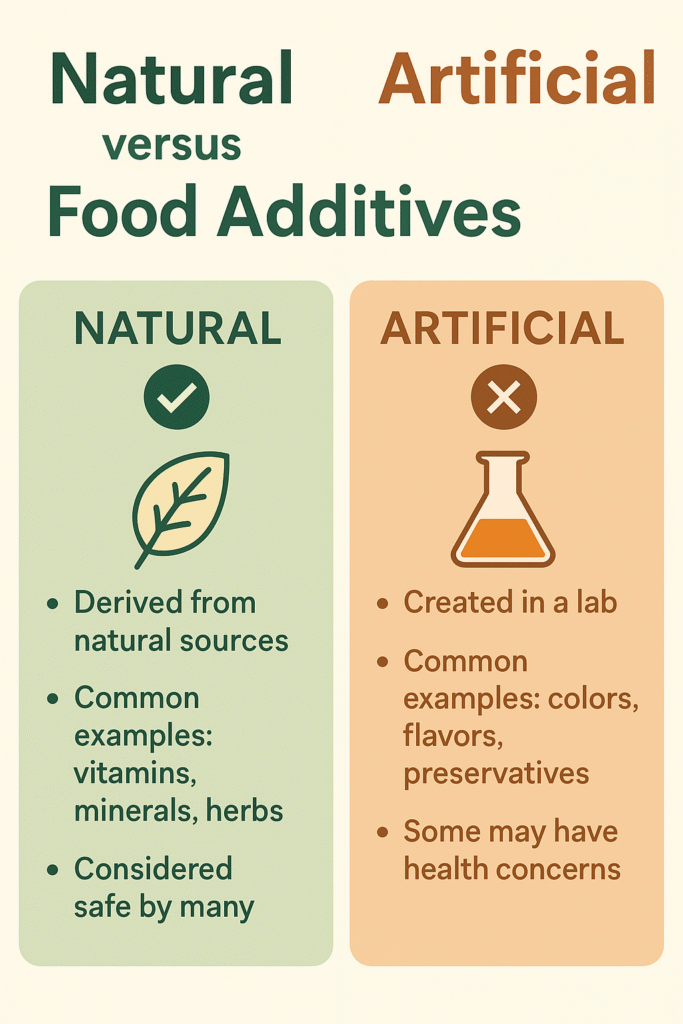From the color of your favorite candies to the shelf life of your go-to snack, food additives play a huge role in the modern food industry. But not all additives are the same. One of the most common questions among manufacturers and consumers alike is: What’s the difference between natural and artificial food additives?
Understanding this distinction is especially important for food producers, health-conscious brands, and companies sourcing ingredients from a trusted food additives supplier. Both types of additives serve essential functions, but how they’re made and how they impact the body can vary significantly.
At M & U INTERNATIONAL, we provide high-quality food ingredients and additives to manufacturers around the globe. In this post, we break down the key differences between natural and artificial food additives so you can make informed decisions for your products or your diet.

What Are Food Additives?
Food additives are ingredients incorporated into food products to enhance their taste, appearance, texture, longevity, or nutritional content. These can include preservatives, emulsifiers, stabilizers, sweeteners, colorants, and flavor enhancers.
Some additives are derived from natural sources like plants and minerals, while others are chemically synthesized in laboratories. Both types are regulated by government agencies such as the FDA or EFSA and are generally recognized as safe when used appropriately.
Natural Food Additives
Natural food additives come from sources found in nature, including fruits, vegetables, animal products, and minerals. They are minimally processed and usually undergo simple extraction or refinement techniques.
Common Examples:
- Beet juice powder, commonly used as a natural red coloring agent
- Citric acid (from citrus fruits, used as a preservative and flavor enhancer)
- Guar gum (a thickener made from guar beans)
- Pectin (found in apples and citrus, used as a gelling agent in jams)
Natural additives are often preferred by health-conscious consumers and organic brands. They are perceived as safer and more environmentally friendly, although natural does not always mean allergen-free or risk-free.
Artificial Food Additives
Artificial food additives are chemically synthesized and not found naturally in the food supply. They are designed to replicate or enhance the effects of natural additives, often offering greater stability, consistency, or cost-effectiveness.
Common Examples:
- Aspartame (an artificial sweetener)
- Sodium benzoate (a chemical preservative)
- Tartrazine (Yellow No. 5) (a synthetic dye)
- MSG (Monosodium glutamate) (a flavor enhancer)
Artificial additives have been subject to more scrutiny over the years. While many are proven safe through scientific studies, some consumers remain wary due to concerns about allergens, hyperactivity in children, or long-term health impacts.
Key Differences at a Glance
| Category | Natural Additives | Artificial Additives |
| Source | Plants, animals, minerals | Chemically synthesized |
| Processing | Minimal | Extensive chemical processing |
| Consumer Perception | Often seen as safer or more wholesome | Viewed with more skepticism |
| Cost | Typically higher | Usually more cost-effective |
| Shelf Stability | May be less stable | Often more shelf-stable |

Why the Difference Matters
For food manufacturers and suppliers, choosing between natural and artificial additives involves balancing several factors: cost, consumer expectations, shelf life, and product functionality. Natural additives appeal to clean-label and organic markets, but they may come at a higher price or offer less consistency in mass production. Artificial additives, on the other hand, provide control and efficiency, making them popular for large-scale manufacturing.
Whether you’re formulating a new health drink or developing packaged snacks, partnering with a reliable food additives supplier is essential. The right supplier can offer insight into which additives best match your production needs and consumer goals.
M & U INTERNATIONAL: Your Trusted Source for Quality Additives
At M & U INTERNATIONAL, we understand that the quality and source of your food additives directly impact your final product. That’s why we offer a wide selection of both natural and artificial ingredients, meeting strict regulatory standards and tailored to the specific demands of our clients.
As a leading food additives supplier, we take pride in delivering consistent, high-purity ingredients to industries across the globe. From food and beverage to pharmaceuticals and cosmetics, our team works closely with clients to find the right solution, natural, artificial, or a blend of both.
Choosing the Right Additive Strategy with a Food Additives Supplier You Can Trust
Understanding the difference between natural and artificial food additives empowers you to make smarter decisions for your business or lifestyle. Each type has its place in the food system, and the best choice often depends on your priorities, whether that’s clean labeling, affordability, or shelf stability.
Working with an experienced food additives supplier like M & U INTERNATIONAL ensures you get both guidance and quality in every order. Whether you’re seeking natural flavoring agents or cost-effective synthetics, we’re here to support your innovation, compliance, and customer satisfaction.ss
Let us help you bring better products to life, with ingredients you can trust.